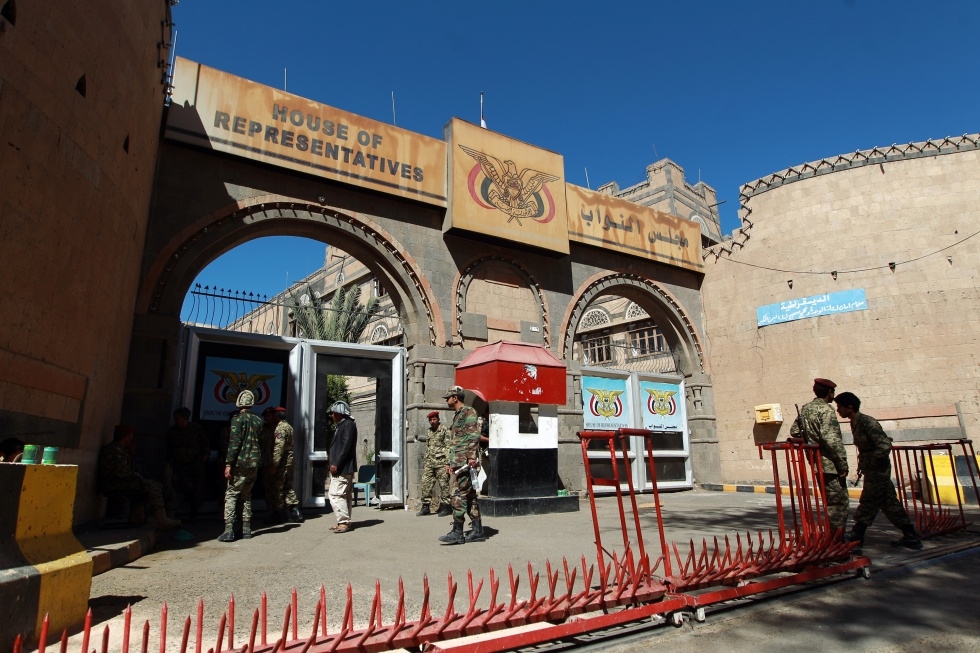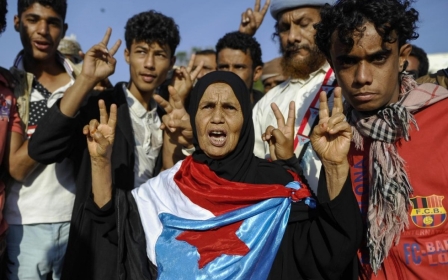Houthis block Yemen's iconic Change Square ahead of uprising anniversary

Supporters of Yemen’s Houthi movement blocked off all roads leading to Change Square, an iconic location in the capital, Sanaa, ahead of the fourth anniversary of the 2011 uprising.
Local news sites reported that dozens of armed Houthi supporters were deployed in the square ahead of the celebration.
The timing of the move angered many – Change Square was the site in 2011 of a months-long tented encampment during which Yemenis called for political change during the so-called Arab Spring.
On the eve of the fourth anniversary of the uprising, which finally ousted strongman president Ali Abdullah Saleh after decades in power, the Houthi leader gave a televised speech calling on his supporters to celebrate the occasion.
“We are living in the shadow of an ongoing revolution, which aims to achieve freedom, dignity and an escape from misery,” Abdel Malik al-Houthi said in a speech broadcast by the Houthi-owned al-Masirah satellite channel.
Late last week, Houthi militias in the square detained five youth activists who were active during the month-long protests in 2011 and had been protesting against Houthi rule, Al-Jazeera reported.
A prominent Yemeni broadcaster resigned her position on Tuesday, claiming that her employer refused to air descriptions of actions committed by the Houthis.
Mona Safwan had worked as a presenter on the Lebanon-based satellite channel al-Mayadeen, but stepped down after an analysis programme about extrajudicial arrests by the Houthis was allegedly barred.
Nabil Sabieh, a Yemeni commentator who featured on the unaired programme, later posted the text of the discussion on Facebook.
"Nobody denies that peaceful demonstrators are being detained by militias, not even the Houthis themselves."
Opposing protests planned for Wednesday
Wednesday is expected to be a day of large-scale protests and rallies across Yemen to mark the anniversary, with activist groups putting out calls for action.
The capital will be the scene of two opposing demonstrations on Wednesday.
One will be attended by supporters of the Houthi militia group, while the other will be made up of anti-Houthi protesters marking the protests that overthrew former president Saleh.
Tawakkol Karman, a Nobel Peace Prize winner who became a figurehead of the 2011 uprising, said Tuesday that “February 11 will be the start of the new revolutionary wave that will topple the militia coup and expel them from our capital”.
In a television interview broadcast on Tuesday, Saleh admitted publicly for the first time that he is linked to the Zaydi Shi'ite rebel movement.
"I don't deny that there [I have] communication, most of which is in the form of advice, with the brothers in Ansarullah [the name the Houthis use to describe their movement]."
There has been speculation for months that ousted President Saleh has been backing the Houthis in hopes of winning back power, but Tuesday's interview marks the first time Saleh has confirmed his links to the movement.
US embassy in Sana'a to close, drone strikes continue
Yemen was rocked by new political upheaval last Friday when the Houthis, who have been consolidating their power since taking over the capital last September, announced that they were dissolving the parliament and replacing it with a Houthi-appointed body.
Many anti-Houthi activists within Yemen dubbed the move a “coup”.
The international community also denounced the takeover.
The US said they were “deeply concerned” by the act, which has left Yemen under the de facto leadership of the unelected Mohammed Ali al-Houthi, who describes himself as the “President of the Revolutionary Council”. The Arab League and the Gulf Cooperation Council, however, went further labelling the events a "coup".
If the US publicly recognises the Houthi takeover as a coup, it will be forced to cut aid to Yemen, due to a Foreign Assistance Act that prevents Washington from sending aid to “any country whose duly elected head of government is deposed by military coup or decree”.
The US has pledged over $74mn in humanitarian aid to Yemen in 2015, as well as over $102mn in military and police aid, according to figures compiled by the US-based Security Assistance Monitor.
The US embassy in Sanaa is set to close by Wednesday, sources told Reuters, with officials saying that diplomats and marines guarding security at the mission will be evacuated from the country.
It is thought that Washington will ask the Turkish and Algerian missions to look after US interests in the country after the evacuation of their personnel.
There were also reports that staff at the US, British, German and French embassies had been getting rid of documents, a sign that any planned departure could be long-term.
US State Department spokesperson Jen Psaki did not confirm reports of the embassy’s closure during a press briefing on Tuesday.
Speaking in Washington, Psaki stressed that US counter-terrorism operations in Yemen are ongoing, saying “we will continue to take action to disrupt imminent threats”.
Yemeni officials said a US drone strike on Tuesday killed four suspected members of al-Qaeda in the Arabian Peninsula, a key foe of the Houthis, and it is the group which claims to have encouraged the attacks on the French satirical magazine Charlie Hebdo.
The strike would be the fourth such incident since 25 January, when US President Barack Obama vowed that the political turmoil rocking Yemen would not deter US counter-terrorism efforts in the country.
However, AQAP militants denied that the strike, thought to have hit Hadramaut province in south-eastern Yemen, had occurred.
Houthis seize control of strategic Bayda province
In the centre of the country, the Houthis secured control of the strategic Bayda province after entering the provincial capital, Bayda City.
Bayda is seen as a gateway to the oil-rich eastern province of Mareb, as well as marking the border-line between Yemen's north and the secessionist south.
Local sources told Al-Jazeera on Tuesday that Houthi fighters advanced into Bayda City with backing from Yemen's official army, including tanks and heavy artillery.
The city was calm in the hours after the Houthi takeover.
However, on Tuesday night nine Houthi fighters were killed and 15 injured when clashes broke out between the militias and local tribes, Sky News Arabia reported.
Middle East Eye propose une couverture et une analyse indépendantes et incomparables du Moyen-Orient, de l’Afrique du Nord et d’autres régions du monde. Pour en savoir plus sur la reprise de ce contenu et les frais qui s’appliquent, veuillez remplir ce formulaire [en anglais]. Pour en savoir plus sur MEE, cliquez ici [en anglais].




